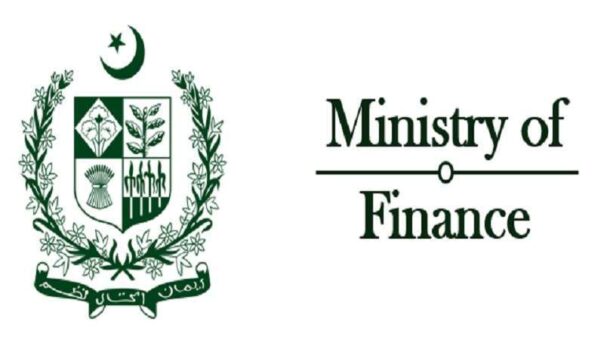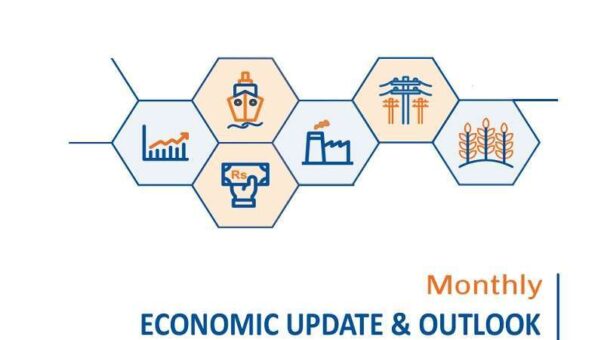Islamabad, June 8, 2023: The Ministry of Finance in Pakistan is set to launch the Economic Survey of Pakistan for the fiscal year 2022-2023 today.
(more…)Tag: finance ministry
-

Ministry debunks petroleum prices circulating on social media
The finance ministry on Sunday debunked a circulating social media notification claiming an increase in petroleum prices as ‘fake.’
(more…) -

Indicators show further slowdown in Pakistan economy: Finance Ministry
The economic indicators released by the finance ministry have shown that the Pakistan economy has slowed down even further.
(more…) -

Finance ministry announces salary increase, promotions of government employees
ISLAMABAD: The Finance Ministry on Wednesday announced special incentives for federal government employees in grade-01 to grade-15.
(more…) -

Finance Division rebuts economic emergency report
ISLAMABAD: Finance Division on Tuesday strongly rebutted the reports regarding proposals under consideration for imposing economic emergency.
According to a statement issued by the finance division, a false message on supposed economic emergency proposals has been circulating on the social media in recent days.
READ MORE: Pakistan purchases 450,000 metric tons wheat from Russia
The finance division not only strongly rebuts the assertions made in the said message and but also categorically denies it and that there is no planning to impose economic emergency.
The message is unfortunately aimed at creating uncertainty about the economic situation in the country and can only spread by those who do not want to see Pakistan prosper.
Creation and spread of such false messages is against national interest in these times of economic hardship. A mere reading of the nine points mentioned in the message indicates how far-fetched those suggestions are.
READ MORE: Saudi Arabia extends term of $3 billion deposit for Pakistan
It is also quite inappropriate to equate Pakistan with Sri Lanka, given inherent strength and diversity in Pakistan’s economy.
The present difficult economic situation is mainly the result of exogenous factors like commodity super-cycle, Russia-Ukraine war, global recession, trade headwinds, Fed’s increase in policy rates and devastation wreaked by unprecedented floods.
The government has been making utmost efforts to minimize the impact of such external factors, even when faced with the economic consequences of unprecedented floods and having to meet IMF conditionalities.
READ MORE: Pakistan exports plunge 18.34pc in November 2021
The authorities are committed to completing the IMF program while meeting all external debt repayments on time. In this challenging economic situation, the government has put in place a number of austerity measures with the approval of the Federal Cabinet.
Such measures are in public knowledge and are aimed at eliminating non-essential expenditures. Similarly, the Government has been deliberating energy conservation mainly aimed at reducing the import bill.
Such deliberations will continue in the Cabinet and all decisions will be taken in consultation with all stakeholders and in the best national interest. With the efforts of the current government, the IMF program has come back on track and negotiations leading to 9th Review are now at an advanced stage. Government’s recent efforts have resulted, amongst others, in lower current account deficits in recent months and achievement of FBR revenue targets.
READ MORE: SBP foreign exchange reserves fall to $7.5 billion
Easing up of pressure on external account is also foreseen in the near future. While there remains the need to make structural adjustments in the mid-term, the economic situation of the country is now moving towards stability.
Finance Division urges the people of Pakistan to contribute towards economic betterment and stability and not to pay heed to malicious rumors mongering which is against the national interest of Pakistan.
-

Probe initiated into tax information leaks of COAS family members
Islamabad: The Federal Finance Ministry has launched a probe into the unauthorized disclosure of tax information pertaining to the family members of General Qamar Javed Bajwa, Chief of Army Staff (COAS), a statement confirmed on Monday.
(more…) -

Pakistan budget deficit widens by 43% in first quarter of 2022-2023
ISLAMABAD: Pakistan budget deficit has widened by 43 per cent in the first quarter (July – September) of current fiscal year 2022-2023, according to official data released by the ministry of finance on Friday.
The budget deficit of the country was 1 per cent of the GDP during the first quarter of the current fiscal year as compared with the deficit of 0.7 per cent in the corresponding quarter of the preceding fiscal year.
READ MORE: Pakistan FX reserves rise to $14.69 billion after ADB transfer
According to data the total revenue increased to Rs2.02 trillion during the quarter under review as compared with Rs1.81 trillion in the same quarter of the last year.
The tax revenue rose to Rs1.78 trillion during July – September of the current fiscal year as compared with Rs1.53 trillion in the same period of the last year.
READ MORE: Pakistan’s import restrictions help narrowing trade deficit by 27%
Non-tax revenue however fell to Rs235 billion during the first quarter of the current fiscal year when compared with Rs276 billion in the same period of the last fiscal year.
During the period under review expenditures of the country rose significantly to Rs2.83 trillion as compared with Rs2.25 trillion in the corresponding period of the last fiscal year.
Out of total expenditures, the current expenditures grew sharply to Rs2.54 trillion during first quarter of the current fiscal year as compared with Rs1.97 trillion in the same quarter of the last fiscal year. The mark-up payment during the quarter under review also surged to Rs954 billion when compared with Rs623 billion in the corresponding quarter of the last year.
READ MORE: Threshold of letter of credit payment increased to $100,000
Defence spending increased to Rs313 billion during the first quarter of the current fiscal year as compared with Rs262 billion in the same period of the last fiscal year.
The present government spent an amount of Rs220 billion on development projects during the quarter under review, which fell from Rs265 billion in the corresponding quarter of the last year.
READ MORE: Headline inflation surges by 26.6% in October 2022
Overall budget deficit recorded at Rs809 billion during the first quarter of fiscal year 2022-2023 when compared with the deficit of Rs438 billion in the same quarter of the last fiscal year.
The size of GDP has been recorded at Rs78.197 trillion in July – September of the current fiscal year as compared with Rs66.95 trillion in the same period of the last fiscal year.
-

Pakistan flood rehabilitation poses challenge to fiscal consolidation
ISLAMABAD: Catastrophic flood in Pakistan has required rehabilitation and massive expenditures which will pose significant challenge for fiscal consolidation, the ministry of finance said on Sunday.
In the monthly Economic Update and Outlook October 2022 released by the ministry of finance said that on the other hand, growth prospects have weakened, along with contained economic activities and low demand will impact on resource mobilization. Thus, current fiscal year is moving with challenges, seeking balance policy mix for stabilization.
READ MORE: ECC approves grant for salary disbursement to PSM employees
In the long run, sound fundamentals and a healthy growing economy, a significant raise is required in gross fixed capital formation instead on consumption. This will increase the National Income significantly. Further, there is need to enhance the productive capacity and productivity in each sector to substitute imports by domestic production and provide more supply capacity to the foreign markets, the report added.
The trade balance of Pakistan is expected to improve in the coming months on account of import contraction due to a deceleration in domestic economic activities and aggregate demand.
READ MORE: Headline inflation likely to increase 22.7% in October 2022
“Overall economic outlook shows an optimistic picture of the economic performance in the coming months. The Consumer Price Index (CPI) inflation is declining, rupee has gained stability, current account balance is on improving trend. These development indicate that economic activity will remain positive and persistent in coming months”, the report added.
It said for the future path of inflation, the exchange rate is of utmost importance. Moderating inflation also contributes to exchange rate stability, which in the benign case may generate a virtuous inflation-exchange rate cycle. Further, the exchange rate stability requires sound economic fundamentals.
Besides inflation, also a manageable current account deficit and guaranteed financing of this deficit by healthy financial inflows are required. When markets get convinced about these prospects, speculative bubbles in the exchange market would be highly unlikely.
In the baseline short to medium run, helped by sound domestic fiscal and monetary policies, the current account deficit is expected to reduce. A major risk factor, though, relates to the necessary imports to absorb the devastating consequences of the floods. However, downward revision of Pakistan’s main trading partners’ outlook may have a downside risk for exports in coming months.
READ MORE: SBP’s weekly forex reserves dip by $157 million to $7.44 billion
The report added that the provisional net tax collection in September FY2023 stood at Rs 684.8 billion against Rs 534.0 billion in the same month of last year, posting a growth of 28.2 per cent. Thus, the first quarter of the current fiscal year ended up with a growth of 17 per cent with a net tax collection of Rs 1633.9 billion against Rs 1396.4 billion in the comparable period of last year.
Similarly, the target for the first quarter has also been surpassed by Rs. 24.4 billion.
The fiscal deficit during July-August FY2023 has been recorded at 0.9 per cent of GDP (Rs.672 billion) against the deficit of 0.7 per cent of GDP (Rs.462 billion) in the same period of last year. While the primary balance posted a deficit of Rs.90 billion (-0.1 per cent of GDP) in July-August FY2023 against the deficit of Rs 37 billion (-0.1 per cent of GDP) in the comparable period of last year.
The Current Account posted a deficit of $ 2.2 billion for July-September of current fiscal year as against a deficit of $ 3.5 billion last year, mainly due to increase in exports and contraction in imports.
Pakistan’s total liquid foreign exchange reserves increased to $ 14.6 billion on October 26, 2022, with the SBP’s reserves now stood at $ 8.9 billion. Commercial banks’ reserves remained at $ 5.7 billion.
READ MORE: SBP receives $1.5 billion from Asian Development Bank
According to FCA, the production of Sugarcane decreased by 7.9 percent to 81.6 million tonnes from 88.7 million tonnes of last year’s production, the report said adding that rice production declined by 40.6 percent to 5.5 million tonnes over last year’s production of 9.3 million tonnes.
Maize production decreased by 3.0 percent to 9.2 million tonnes compared to 9.5 million tonnes last year. The cotton production declined by 24.6 percent to 6.3 million bales from 8.3 million bales last year. The wheat production target for upcoming Rabi 2022-23 is fixed to the tune of 28.370 million tonnes from an area of 9.3 million acres.
With respect to inflation, the report said it can be expected that YoY CPI inflation in the month of October will maintain its declining tendency observed in September. It is expected that CPI inflation will remain in the range of 21-22.5 per cent.
-

Miftah resigns as finance minister after taking tough decisions
Dr. Miftah Ismail has resigned the post of the finance minister on Sunday. Ismail has taken many tough decisions for the country’s economy during his stay since April 2022.
“In a meeting with Mian Nawaz Sharif and Prime Minister Shehbaz Sharif today [Sunday September 25, 2022], I have verbally resigned as Finance Minister. I will tender a formal resignation upon reaching Pakistan. It’s been an honour to serve twice as Finance Minister,” Miftah Ismail said in a Tweet.
READ MORE: Pakistan’s forex reserves slip to $14.07 billion
Miftah Ismail assumed the charge as finance minister as soon the new coalition government led by PML (N) came into the power after the former Prime Minister Imran Khan of Pakistan Tehreek I Insaaf (PTI) was ousted through a vote of confidence.
During this period Pakistan had seen severe economic crisis, especially the balance of payment, local currency depreciation and negotiations with the International Monetary Fund (IMF).
READ MORE: ECC approves clearance of banned items landed till August 18, 2022
The biggest achievement of Miftah Ismail was successful negotiations with the IMF. Although, the government had taken very tough decisions, especially removal of subsidies on petroleum products and energy to achieve the IMF bailout package.
READ MORE: USC to disburse ration bags worth Rs540 million to flood victims
It is learnt that senator Ishaq Dar is assuming the charge as finance minister. Dar was living abroad for the last many years. However, the present government is believing that Dar was the best choice to face challenges that the country was facing.
Ahsan Iqbal, Federal Minister Planning and Development has acknowledged the services of Miftah Ismail and said in a Tweet: “You served under most challenging circumstances. You saved default at the cost of personal reputation. Your services will be remembered.”
READ MORE: Pakistan State Oil gets Rs30 billion to avoid default
-

Industry slams finance ministry for blocking letter of credit
KARACHI: The industry has strongly criticized the ministry of finance for directing banks not to open letters of credit for essential machinery, equipment and spare parts.
“Pakistan’s industrial sector is gradually heading towards doldrums because of the adamant attitude of Ministries of Finance and Commerce to block banks from opening Letters of Credit or remitting advance payments for imports of essential machinery, equipment and spare parts,” this was stated on Tuesday in a press statement by Ismail Suttar, President Employer’s Federation of Pakistan.
READ MORE: Clearance of banned cars, phones allowed on 100% surcharge
Ismail Suttar further said that such blanket refusal under HS 84 and 85, which are for imports of machinery, spare parts, electrical and electronic equipment, vehicle CBUs and CKDs, and other essential items, is detrimental to the functioning of any industry, especially when a particular item is not manufactured in Pakistan.
EFP, which is the apex body of industries, is daily receiving frantic messages from member companies who are unable to maintain their production or adhere to delivery schedules. Moreover, a decrease in production eventually increases the cost of the product.
READ MORE: Pakistan lifts ban on import of cars, phones, luxury items
EFP President added that the industrialists fully understand the compulsions under which this embargo has been instituted but the government has to be pragmatic in its policies and must take cognizance of the ground realities. He advised the Ministers of Finance and Commerce to take private sector into confidence regarding the time frame of this embargo.
READ MORE: 15% surcharge imposed for clearance of banned items
Ismail Suttar also said that EFP has information that over 6,000 applications are pending before the SBP and this figure is not only mind-boggling but also a manifestation of the economic crisis faced by the country. The policy of refusal is negatively impacting on exports as well as affecting industries that are playing a prominent role in import substitution.
He added that the recent catastrophic floods have further compounded the already dire straits through which the industries are facing. He said his message is quite clear. Save industries before they close down and retrench workers thus creating a major social crisis.
READ MORE: SBP assures allowing stuck up containers of banned import